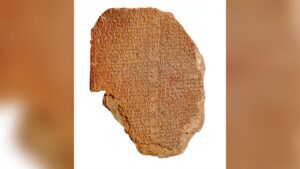
“Gilgamesh Dream Tablet” (Photo courtesy of US Department of Justice)
The epic saga of Gilgamesh continues as Hobby Lobby is once again caught in the crossfire of illicit antiquities trafficking. Yesterday, federal authorities forfeited a 3,500 year old clay cuneiform tablet known as the “Gilgamesh Dream Tablet” from the crafting giant. The tablet contains a portion of the “Epic of Gilgamesh” where the protagonist describes his dreams to his mother. It is considered a rare and ancient masterpiece of world literature.
The federal government had originally seized the tablet in 2019 and filed a civil forfeiture action in May 2020 to return it to Iraq. The tablet’s provenance was falsified to assert that it had been discovered in a box purchased at a California auction in 1981. In reality, the item had been purchased by an American dealer in London in 2003, who then brought it to the US. This timing coincided with widespread looting of archaeological sites in Iraq as a result of the ongoing war with the US. Hobby Lobby purchased the tablet for $1.6 million at a Christie’s auction in 2014, relying on the auction house to perform the appropriate due diligence. It transpired that the previous owner had warned Christie’s that the tablet’s stated provenance would not withstand scrutiny. The auction house failed to notify Hobby Lobby of this fact even after the craft company had expressed concerns. Ultimately, Hobby Lobby cooperated with the authorities and consented to the tablet’s forfeiture.
However, this is not Hobby Lobby’s first brush with the law over looted Middle Eastern antiquities. In 2010, representatives of Hobby Lobby purchased thousands of antiquities originating from Iraq for display at the future Museum of the Bible. The provenance information for the objects was fabricated, listing their origin as Israel or Turkey to avoid suspicions of illicit trafficking. Notably, Hobby Lobby consulted a respected cultural heritage expert regarding its acquisition, but went against her advice and continued with the transaction, ignoring several red flags indicating that the items had been looted. In 2017, a civil forfeiture action was filed and Hobby Lobby agreed to pay a $3.3 million fine and return over 5,500 looted objects to Iraq.
In this instance, our founder Leila Amineddoleh served as a cultural heritage law expert for the Eastern District of New York. She was extensively quoted on her participation in the matter in national media and trade outlets. She noted how the verdict resulted in greater public scrutiny over the purchase of antiquities and a higher expectation of due diligence measures related to provenance, even for so-called “inexperienced” purchasers. (Information about the matter can be found in our prior blog posts here and here.) This approach has indeed borne fruit, as the forfeiture of the Gilgamesh Dream Tablet demonstrates.
Law enforcement authorities in the US have been actively pursuing black market antiquities and disrupting trafficking networks for some time, but judicial enforcement and specialist support are also crucial. Many countries that suffer from cultural property looting and trafficking, including Iraq, have applicable provenance laws that cover items like the tablet. Furthermore, the US has placed import restrictions on Iraqi cultural property since 1990 and implemented sanctions as recently as 2010, allowing the government to seize objects at or after import. Judicial precedent has empowered US courts to recognize foreign patrimony laws and classify such objects as stolen property, increasing their protection on US soil, but government agents rely on knowledgeable attorneys and experts to advise them on cultural property protection and available legal remedies.
Amineddoleh & Associates LLC is proud to have a founder that has advised the government extensively on such matters and is a staunch advocate for responsible acquisition practices to combat the illicit antiquities trade. Our firm deals with various cases involving potentially looted items on behalf of private and public parties, and we are committed to ensuring that cultural property is protected irrespective of origin. Our strong track record in this field is a testament to our expertise and commitment to stemming the trade in looted objects. We commend the Department of Justice for its excellent work and look forward to continued collaboration in the future with law enforcement to ensure that looted antiquities return to their rightful homes.